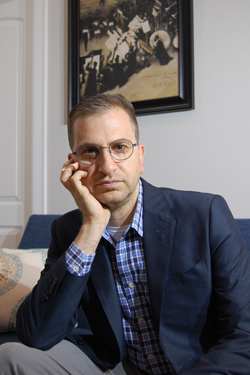BIOGRAPHY
Composer Karim Al-Zand’s (b.1970) music is acclaimed for its expressive power and imaginative spirit, described by the Boston Globe as “strong and startlingly lovely.” His works have been performed across North America and internationally, earning him such distinctions as the Arts and Letter Award from the American Academy of Arts and Letters and the 2024 Barlow Prize. A prolific and versatile composer, Al-Zand has created a catalogue of works spanning orchestra, opera, chamber, vocal and solo repertoire.  His music embraces a variety of interests, issues and influences. It explores connections between sound and other art forms, drawing inspiration from graphic art, myths and fables, folk music of the world, film, poetry, jazz, and his own Middle Eastern heritage. From compositions for young audiences to scores for dance to interdisciplinary projects, Al-Zand’s music resonates with a wide range of listeners and collaborators. Alongside his creative work, Al-Zand is a founding and artistic director of Musiqa, Houston’s leading contemporary music ensemble, where he helps shape programming of 21st century repertoire. In his scholarly work, he has pursued several diverse areas of music theory, including topics in jazz, counterpoint, and improvisation (both jazz and 18th century extemporization). Al-Zand was born in Tunis, Tunisia, to an Iraqi father and an American mother. He was raised in Ottawa, Canada and educated in Montreal (McGill University, BMus 1993) and Cambridge (Harvard University, PhD 2000). Since 2000 he has taught composition and music theory in Houston at the Shepherd School of Music, Rice University.
His music embraces a variety of interests, issues and influences. It explores connections between sound and other art forms, drawing inspiration from graphic art, myths and fables, folk music of the world, film, poetry, jazz, and his own Middle Eastern heritage. From compositions for young audiences to scores for dance to interdisciplinary projects, Al-Zand’s music resonates with a wide range of listeners and collaborators. Alongside his creative work, Al-Zand is a founding and artistic director of Musiqa, Houston’s leading contemporary music ensemble, where he helps shape programming of 21st century repertoire. In his scholarly work, he has pursued several diverse areas of music theory, including topics in jazz, counterpoint, and improvisation (both jazz and 18th century extemporization). Al-Zand was born in Tunis, Tunisia, to an Iraqi father and an American mother. He was raised in Ottawa, Canada and educated in Montreal (McGill University, BMus 1993) and Cambridge (Harvard University, PhD 2000). Since 2000 he has taught composition and music theory in Houston at the Shepherd School of Music, Rice University.
[UPDATED 04/2025]
GENERAL MANAGEMENT
LocksBridge Artist Management
Profile on locksbridge.net
Onur Tahmaz, Managing Partner & Artist Manager
onur@locksbridge.net
Duygu Esenkar, Managing Partner & Artist Manager
duygu@locksbridge.net
LocksBridge Artist Management LLC
855 Boylston St #1000,
Boston, MA 02116
The Singing Tree
In 1999 I composed Parizade and the Singing Tree, after a story from the famed collection of folktales, The Thousand and One Nights—the so-called “Arabian Nights.” Inspired by the imagery of the story and by the tradition of Arabic figural calligraphy, the Singing Tree logo (at left), is formed by weaving together various rotations and transpositions of my name.

